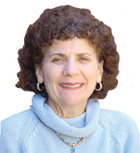
By: Barbara Jacobs, M.S., President, Front Row Seat Videos
As a caregiver for someone with dementia, you may be wondering what “gift” you could give them at some point. Have you considered music that they not only will enjoy and benefit from but also will remember?
“Remember” you might say?
In my 15 years of experience as a therapeutic musician leading musical sing-along programs for those with Alzheimer’s disease and dementia, I often see music’s power to unlock memories. My students will remember both the melody and lyrics of old familiar songs as well as the life experiences that music evokes. I find this to be true for all stages of the disease and research confirms my experience.
For example, one of my students at an assisted living facility, Edie, aged late 80s with mid- to late-stage Alzheimer’s, rarely speaks. When I recently played piano during a sing-along program and sang, “Home on the Range,” Edie went from sitting quietly to becoming quite animated as she told me, “I had a horse named Buddy.”
This type of reaction to familiar music no longer surprises me. Yes, music often can bring dramatic behavioral changes, socialization and overall well-being for those with dementia.
It’s academic
Dr. Ardash Kumar of the University of Miami’s School of Medicine found that music provided lasting benefits to elderly men with Alzheimer’s disease who participated in a music therapy program through singing familiar songs 30 to 40 minutes a day, five days a week for a month. Music’s behavioral benefits continued for these men for weeks after their participation in this music program had ended.
With the evidence of the positive benefits of music and singing, wouldn’t it be wonderful if a person could sing every day? There are a variety of ways to bring their favorite music into their lives. Your local public library is a free resource for musical CDs and old movies or operas on DVD that will still bring a smile to their faces and words to their lips, as they sing along with joy and recognition.
There are a number of music and sing-along programs on the market that can be purchased through senior product catalogs such as Sea Bay Games, NASCO and S&S Worldwide. Also, I have developed sing-alongs on DVD.
I have always known that music can open hearts. Through my teaching experience, reinforced by recent research, I have seen how it can open minds as well.
_____
The author is a therapeutic musician who has taught sing-along music classes at long-term care facilities and adult day programs for the past 15 years. She can be reached through www.FrontRowSeatVideos.com.
From the October 01, 2010 Issue of McKnight's Long-Term Care News




